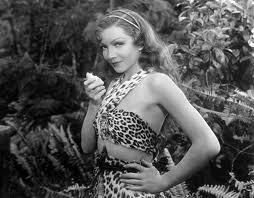Movie Review: Four Frightened People (1934)
The last of the Cecil B. DeMille movies in the set I have, it’s very different from the others, being set in the present day, and having a relatively small cast.
The story opens on a passenger ship that has become infested with bubonic plague. The crew is trying to keep this from the passengers, but ace reporter Stewart Corder recognizes the symptoms. He convinces the people he’s with at the time, a British government official’s wife, Mrs. Mardick (Mary Boland) and a chemist with a specialty in rubber, Arnold Ainger (Herbert Marshall), to secretly abandon the ship on a native’s boat. They are spotted by prim Chicago geography teacher Judy Jones (Claudette Colbert) who screams at the sight, and are forced to kidnap her to keep her quiet.
I should note that the version I watched is a trimmed-down one (maybe the only version still in existence) so there may have been some more characters aboard the ship (described as a cultural melting pot) that were cut from this movie.
When they land in Malaysia (actually shot on location in Hawaii), Mrs. Mardick uses her tenuous grasp of Malayan languages and learns that the local village is suffering from a cholera outbreak. Fortunately for the castaways, one of the locals is a man named Montague (Leo Carillo.) He’s quite a character, with a decent grasp of English. The story kind of lampshades the fact that Carillo doesn’t look at all like a Malayan by having Montague believe that he is, in fact, a white man. He even wears a tie, “Best English make!”
Montague agrees to guide the four to the nearest seaport…and promptly gets them all lost. We also start to see more of the characters’ personalities. Corder is a boastful, self-important man who clearly believes he’s the male lead of any situation he finds himself in, and sometimes acts recklessly. Ainger is a bitter, sarcastic fellow. Both of them feel no interest in the repressed, timid Jones, and are a bit intimidated by the heavyset and upbeat Mrs. Mardick.
Eventually, the group is captured by a hostile tribe, and are forced to leave one of them behind as a hostage. This turns out to be Mrs. Mardick, since her layer of fat proves she is the highest-ranking one. Montague fails to ask directions from the tribe, as that would be admitting he’s not superior to them!
Things get worse as another encounter with a local tribe goes disastrously and Montague is slain. On the other hand, Jones has lost her glasses, hairpins and dowdy clothes, revealing that she is in fact Claudette Colbert, and the men have become interested in her. She’s also discovered her inner spitfire.
Corder, in keeping with his male lead personality, thinks Jones will go for him, but she actually turns out to have a thing for Ainger, whose bitterness came from an unhappy marriage. Problem is, he’s still married, despite returning Jones’ feelings.
By the end, they have learned to live in the jungle, and for Ainger and Jones it’s something of a shame that they must return to their repressed normal lives. But that’s not quite the end of the story.
This movie was made just as the Hays Code was coming in, so there’s quite a bit of spicy material. Jones winds up wearing some pretty skimpy outfits, and there’s a scene where she’s apparently naked in a waterfall. (Some shots make it look like Claudette Colbert was actually wearing a very thin slip, it’s deliberately blurry.) Lots of innuendo in the dialogue, and the topics of family planning and divorce are brought up.
The racism is likely to be problematic for modern viewers; other than Montague, the Malayans are depicted as primitive savages, and Montague considers himself superior because he’s “white.”
The roles for the women are interesting; Mrs. Mardick is the most level-headed of the group, and never really loses her dignity, despite looking faintly ridiculous in her formal wear and carrying around a lapdog. She even turns her captivity into an opportunity to bring family planning to the tribe, much to the delight of the women there, and the consternation of the chief.
Jones, on the other hand, goes from a timid mouse of a woman to someone who expresses her feelings, is unafraid to have opinions and dresses as she pleases. We learn that she was emotionally abused by her relatives, who never let her forget that she owed them for taking her in. A defining moment is when she realizes she actually sees better without her glasses–apparently she’d never had her prescription updated after her relatives complained about the expense of getting her spectacles in the first place.
Ainger also grows in the jungle, his sarcasm mellowing into philosophy. When he gets home, his (much older looking) wife belittles him, along with his live-in mother in law. He finds the backbone to divorce them. Corder, on the other hand, shrinks a bit in the jungle. He’s used to being the center of attention, headline grabber and radio personality. Without an appreciative audience and constant praise, he’s lost. At the end, we hear him giving a speech about his adventures, boastfully rearranging events to make himself sound better.
This is not a particularly good movie, especially by DeMille standards. But it has fun bits, and Claudette Colbert in skimpy outfits. It’ll be well worth popping some corn and enjoying with your friends.

